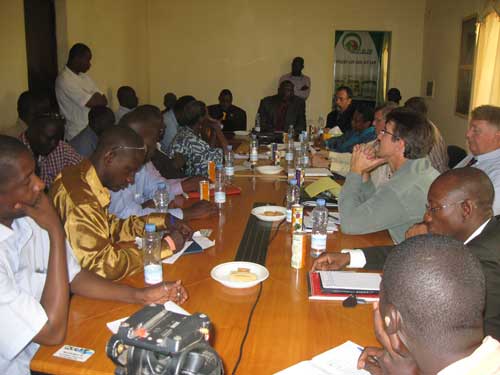 Between 28 June and 22 July 2011, a delegation led by the TSEP co-directors and including three other American elections specialists undertook an intense, but also highly fruitful, trip across the Sahelian region, visiting all six TSEP partner countries.
Between 28 June and 22 July 2011, a delegation led by the TSEP co-directors and including three other American elections specialists undertook an intense, but also highly fruitful, trip across the Sahelian region, visiting all six TSEP partner countries.
With the active participation of our partner organizations, as well as with significant input and help from the alumni of the 2011 US-based program, a diverse set of activities was programmed in each country. In each capital city, a major public event was planned in the form of a roundtable or seminar on elections, at which the US delegation was invited to present and in which the African alumni from the May 2011 TSEP program also took part. These discussions were universally marked by a high degree of local interest, evoking much discussion of very high caliber, and given significant attention in the press.
In addition to these public events, in each country them delegation had meetings and exchanges with important actors, institutions, and organizations involved in the electoral process. These included: A meeting with the director of the National Bureau of Elections in Chad; meetings with the new Minister of Justice and with the president of the Independent National Electoral Commission in Niger; meetings with the coalition of opposition parties and with the main officers of the current ruling party at their headquarters in Burkina Faso; Meetings with the President of the Constitutional Court and with the Minister of Justice in Mali; Meetings with the president of the University of Nouakchott and other high officials in Mauritania; meetings with both the coalition of opposition parties and with a deputy to the National Assembly who was a key supporter of the ruling party in the tense pre-election struggle in Senegal.
In each country the delegation also met with and visited other important government institutions and NGO groups, and gave interviews to the press. Various other activities organized by TSEP alumni provided important insights into Sahelian society and politics. Highlights include a full day visit to the town of Kiota in Niger, seat of a very important branch of the Tijaniyya Sufi Muslim order, where the delegation was received as guests by the most senior members of the religious family. Another highlight was the day-long visit to a rural meeting of elected officials with their constituents in the rural council of Fissel in Senegal, a striking opportunity to see local democracy in action in West Africa.
The trip provided American participants with a rich and nuanced understanding of the key issues surrounding elections and democratic development in West Africa, including both the challenges and difficulties presented by those contexts as well as the remarkable efforts of individuals and civil society groups in struggling for positive outcomes in each country.
